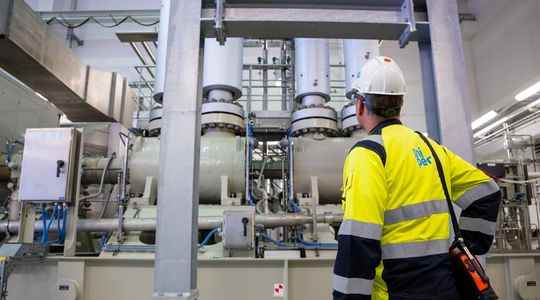No less than 98 billion euros. This is the sum that the European Union paid to the Russian Federation during the first hundred days of the invasion of Ukraine. Prisoner of its dependence on Russian gas and oil, Europe finds itself at the forefront of financiers of the war effort against a Ukraine that it nevertheless claims to support. This tragedy is all the more cruel in that it highlights the inconsistency and pusillanimity of the European position. Worse, it reveals the vulnerability of the Union in the face of the Russian rentier economy, reinforced by the surge in the price of fossil fuels since the beginning of the conflict – and this, despite Western sanctions.
The invasion of Ukraine underlined more clearly than any other oil shock our extreme dependence on fossil fuels. Our only significant domestic resources, the oil and gas fields of the North Sea, passed their production peak in 1999. Since then, the European Union’s energy independence has continued to deteriorate, with the consequences that the we know: deterioration in the trade balance, loss of strategic autonomy in the face of authoritarian regimes in Russia and the Gulf.
Combined with the objectives that the Union has set itself in the face of the climate challenge, this crisis should have led to a massive acceleration of our investment efforts in the energy transition. European consumption of Russian gas is mainly based on housing and electricity. Also, large-scale application – finally! – energy renovation of old residential and commercial buildings would make it possible to significantly limit it.
Limit imports
As for our oil imports, they mainly supply our transport by road. Anything that contributes to decarbonizing the transport sector would help reduce this dependency. Some actions, such as the deployment of new high-quality service bus lines, can be carried out quickly – of the order of twelve to eighteen months without the acceleration that the current emergency could inspire – and are adapted to cities of medium and small size, where the private car is still too often the only way to get around.
Instead, what have we seen since February? An almost general denial of our climate commitments, to guarantee the fossil supply of our economies. It’s who will announce their desire to import American shale gas on a massive scale (France, Germany) the quickest – omitting in passing to underline the massive construction costs of the LNG terminals that this entails -; the reopening of mines (Italy) or the postponement of the abandonment of coal which has just been announced in Germany, with the deleterious consequences that we already know in terms of greenhouse gas emissions. As an unexpected consequence, and here again anachronistic given the climate emergency, the shares of all the oil and gas companies, those of the brown economy, are experiencing a very worrying jump in the financial markets.
It is perfectly understandable that the European Union cannot do without 20% of its fossil gas supply overnight without substitution of the same order. But you have to be severely short-sighted to rule out imaginable energy transition investments on this pretext. Faced with the immediate challenges, reopening a lignite mine is certainly easier than designing an alternative based on renewables and energy efficiency. At the same time, the latter would however make it possible to immunize us against the blackmails of the Kremlin, while achieving our climate objectives.
More profoundly, the war in Ukraine is the first real test of the firmness of our resolve in the face of climate change. As the return of inflation looms over our economies with the threat of recession, and as the parenthesis of “whatever it takes” closes, decarbonization should not be the first priority sacrificed on the altar budget trade-offs. The very poor European reaction to the fossil supply blackmail orchestrated by the Kremlin does not make one very optimistic in this regard.
